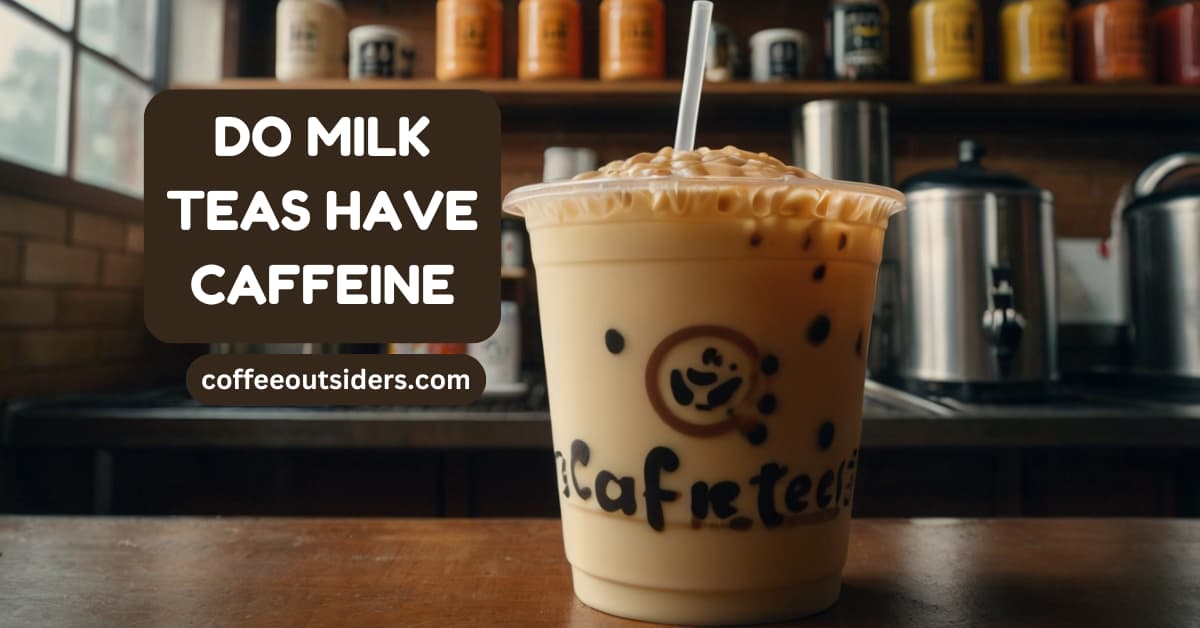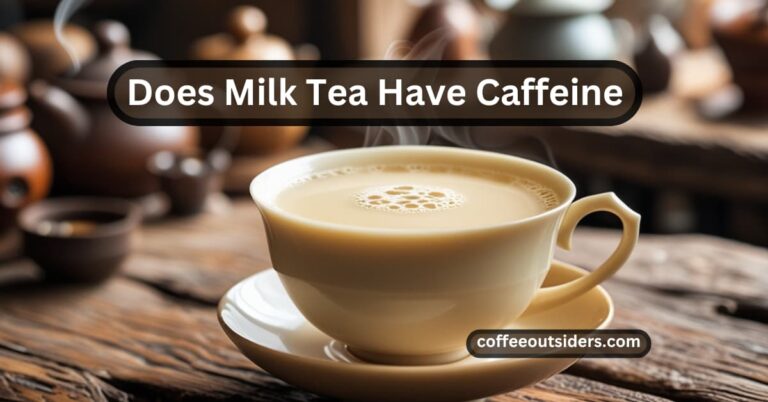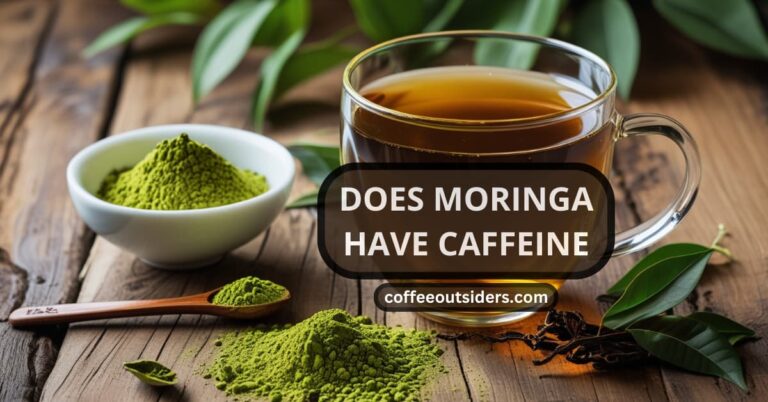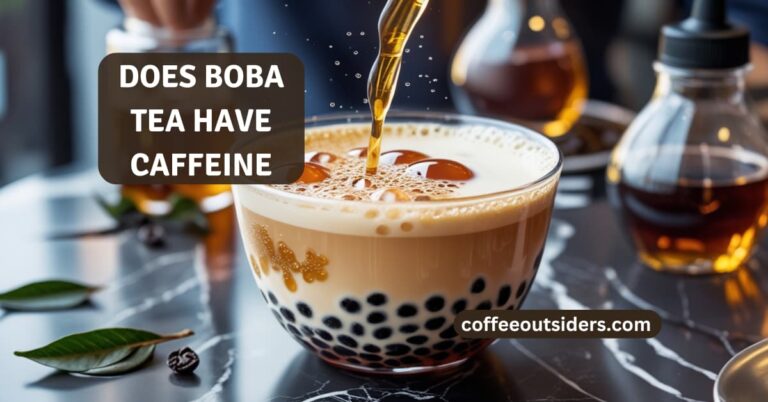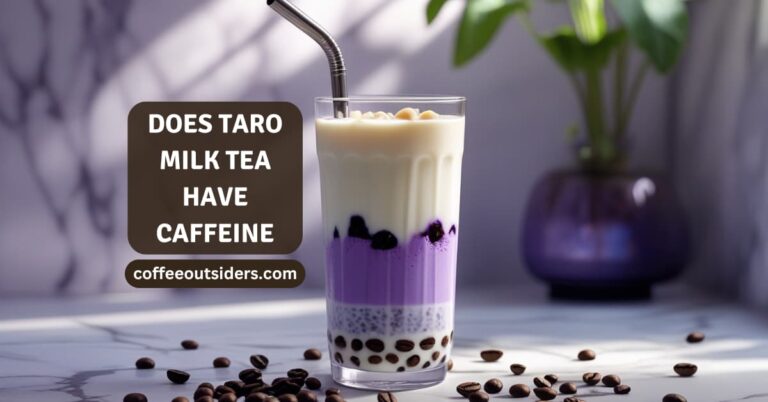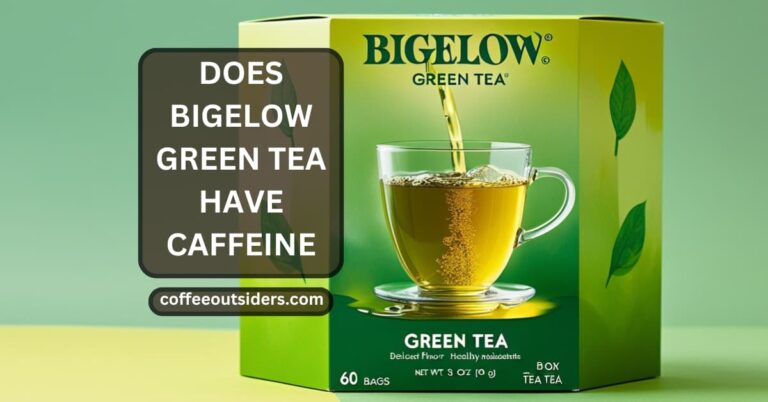Does My Milk Tea Have Caffeine? Here’s what I found out
Did you know that some milk teas have just as much caffeine as a cup of coffee? Crazy, right? I’ve been researching the world of milk to bubble teas in order to find the caffeine secrets.
Think black tea, green tea, or even matcha—all with different caffeine hits. It’s not just about caffeine. Ever wondered what goes into your favorite milk tea?
From milk to tapioca pearls, there’s a lot to chew on. For those watching caffeine, I’ll share some chill options, too. Let’s drink intelligently and enjoy every wonderful bubble without the buzz.
It’s all about balance!
- Since most milk teas are made with tea leaves (black, green, or oolong tea), they contain some caffeine.
- The amount of caffeine in milk teas varies significantly depending on the kind of tea used. How the tea is prepared can also significantly alter the caffeine level.
- Tapioca pearls, sugar, and flavorings don’t contribute caffeine to your milk tea. They do impact its nutrition profile overall.
- Knowing the caffeine content is important for anyone who is sensitive to caffeine or managing caffeine consumption for health reasons.
- If you want to cut back on caffeine, try herbal milk teas or decaf options instead. These tasty options provide a caffeine-free or low-caffeine experience.
- Be aware of the daily recommended intake of milk tea. It will allow you to enjoy it and still stay healthy.
Understanding Caffeine in Milk Teas
When it comes to caffeine, you may envision a hot cup of coffee or an energy drink. It also serves a more important role in milk teas, acting as a natural stimulant. Caffeine is a xanthine compound that fires up mental alertness and improves physical performance. Commonly found in tea, coffee, and energy drinks, it is a household name for many.
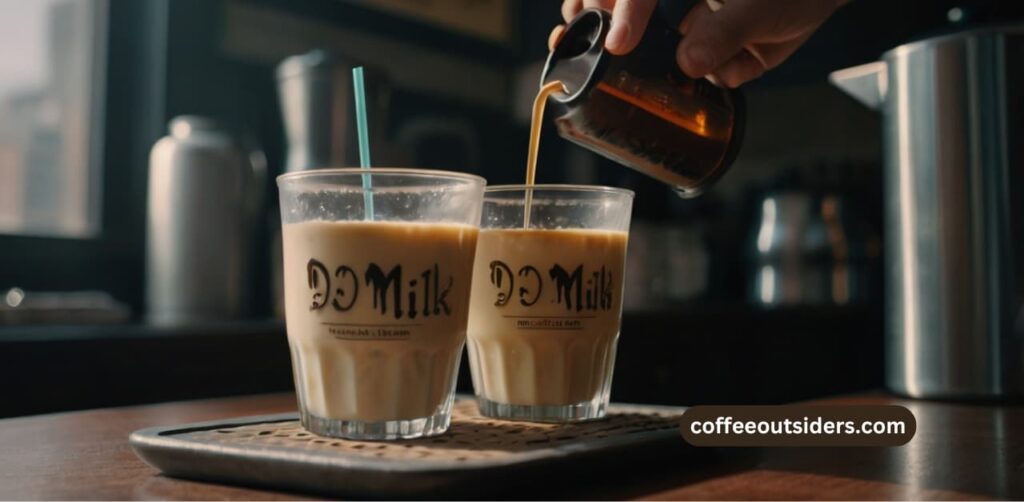
Caffeine increases energy levels due to its unique chemical structure. Whether you’re trying to reduce your caffeine intake or become more aware of it, knowing how much caffeine milk tea contains is helpful.
1. What Is Caffeine?
Caffeine is a fascinating compound found in a variety of common drinks. Its main function is to boost alertness and break through the haze associated with sleepiness; it’s a popular pick-me-up. Tea, coffee, and energy drinks are among the most common sources of caffeine.
Chemically, caffeine is a xanthine, a class of compounds well-known for their stimulant effects. A breakdown of caffeine content shows that a cup of coffee contains about 95 mg of caffeine, while a standard milk tea contains between 20 and 70 mg, depending on the type and preparation.
Black tea-based boba teas pack a punchier caffeine kick, while green tea offers a more subdued energy boost due to its lower caffeine content.
2. Why Know Caffeine Content?
Understanding the caffeine content in your drinks, particularly milk tea, is essential. This knowledge helps you make informed choices that serve you best. Tracking your caffeine consumption can lower anxiety and improve your sleep, both of which are important for a well-balanced lifestyle.
Not everyone reacts to caffeine in the same way, so learning these key differences can help you select the ideal tea for your needs. For beginners, boba teas brewed for shorter steeping times contain less caffeine, making them a great choice for anyone just starting to enjoy this delicious drink.
Many boba shops also allow you to choose the strength of your drink, so you can adjust the caffeine levels to your liking.
3. Health Impact of Caffeine
In moderation, caffeine can be a boon, providing benefits such as increased focus and an energy boost. However, it’s important to watch your intake. Too much caffeine can leave you jittery or unable to sleep, which doesn’t make it any easier to get through the day.
Everyone experiences caffeine differently, so it’s crucial to pay close attention to how your body reacts. Understanding these effects may enable you to enjoy milk tea with full awareness.
For reference, a cup of black tea contains around 40-50 mg of caffeine, while green or jasmine tea contains only 20-30 mg. Moderation is key, especially if you’re sensitive or consuming multiple servings a day. Of course, you can always adapt your consumption to make it work for you.
Types of Milk Teas and Their Caffeine Content
Vandi’s love for the world of milk teas is interesting. This is important to know, particularly for those of us who count our caffeine. Here’s a neat table that gives you an at-a-glance comparison of caffeine levels across various milk teas:
| Milk Tea Type | Caffeine Content (mg) |
| Black Milk Tea | 40-80 |
| Taro Milk Tea | 0-40 |
| Thai Milk Tea | 20-60 |
| Brown Sugar Milk Tea | 20-80 |
| Mango Boba | 0-20 |
| Strawberry Milk Tea | 0-20 |
| Passionfruit Tea | 0-20 |
| Lychee Tea | 0-20 |
| Matcha Milk Tea | 60-70 |
| Coffee Milk Tea | 60-160 |
| Wintermelon Milk Tea | 0-20 |
| Honeydew Milk Tea | 0-20 |
1. Black Milk Tea
Black tea provides a backbone to traditional milk tea. It has a strong taste and is high in caffeine. You can also find black Assam tea at your local bubble tea shop.
On average, there are 60 to 80 mg of caffeine per cup. Brewing tea generally means steeping the leaves in hot water for a few minutes. This method releases more caffeine than other kinds of tea.
Black tea is powerful stuff when it comes to caffeine. While green tea contains an average of 20 to 30 mg of caffeine per cup, black tea wins out as a stronger option.
2. Taro Milk Tea
Taro milk tea has a creamy, nutty flavor. Interestingly, taro itself does not contain caffeine. The caffeine level in taro milk tea largely depends on the tea base you use.
If mixed with a black tea base, the caffeine content climbs as high as 40 mg. Many versions may use caffeine-free alternatives, making this an all-purpose option for those wanting less caffeine.
3. Thai Milk Tea
People love the sweet, spiced flavor of the rich, aromatic Thai milk tea. This delectable drink combines black tea, condensed milk, and an array of spices.
It generally contains between 20 and 60 mg of caffeine. This varies depending on the type of tea used and how long it brews for. Its cultural significance shines in Southeast Asia, as it’s a staple found in both vibrant street food scenes and fine-dining restaurants.
4. Brown Sugar Milk Tea
A newer trend, brown sugar milk tea, has a sweet, caramel-y flavor thanks to the brown sugar syrup. It doesn’t directly increase caffeine content but adds to the perceived energy boost.
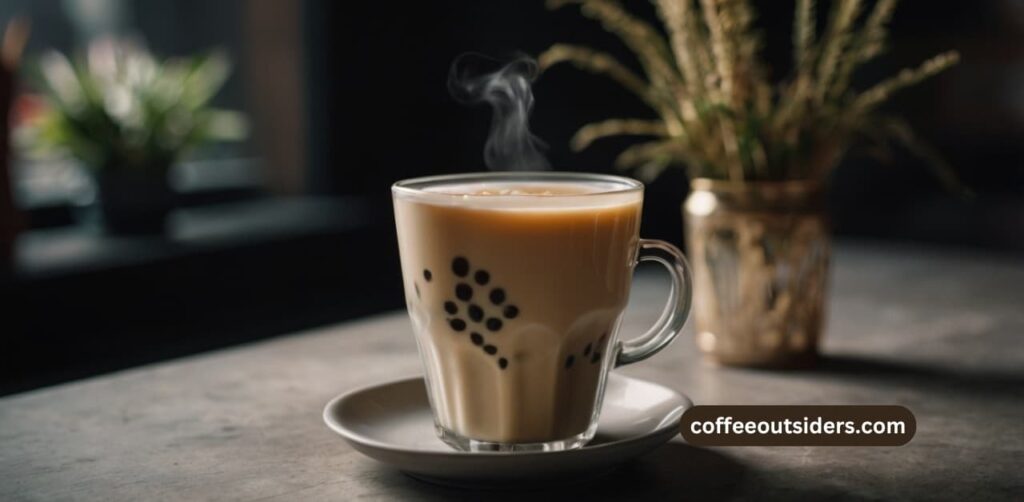
The caffeine levels depend on the tea’s base, which is often black or green. They range from 20 to 80 mg, making them comparable to other flavored teas.
5. Mango Boba
Mango boba brings a fruity flavor into the milk tea family and generally contains a low amount of caffeine. When a tea base is used, it sometimes goes with green or herbal ones.
This option delivers minimal caffeine, usually between 0 and 20 mg. The refreshing mango flavor appeals to consumers looking for a fruit-forward, lighter drink.
6. Strawberry Milk Tea
Strawberry milk tea is popular with younger audiences because of its sweet, appealing flavor. It’s often made with green tea or caffeine-free bases.
As a result, it tends to have low amounts of caffeine, anywhere from 0 to 20 mg. The selection of fresh strawberries versus syrup can also subtly affect the flavor.
7. Passionfruit Tea
Passionfruit tea provides a refreshing choice with its tropical, tangy notes. Caffeine levels generally differ depending on what type of tea you use.
With green or herbal teas, the caffeine content is usually quite low, as low as 0 to 20 mg. This makes it a popular choice for those who enjoy lighter, fruit-infused drinks.
8. Lychee Tea
Lychee tea adds a distinct floral sweetness to this milk tea variety. It’s sometimes blended with green or herbal teas, and the caffeine content is also 0 to 20 mg.
Lychee’s cultural roots in Asian beverages give this increasingly popular choice a more exotic touch.
9. Matcha Milk Tea
Matcha is a powdered form of green tea that boasts some impressive health benefits. It also has antioxidants and has moderate caffeine content (60 to 70 mg).
Matcha milk tea is much thicker and creamier than regular green tea. This difference stems from the quantity of matcha powder you use and how you prepare it.
10. Coffee Milk Tea
Coffee milk tea, a delightful hybrid, marries the bolder flavors of coffee with the more delicate notes of tea. Its caffeine content can range from 60 to 160 mg, depending on the coffee-to-tea ratio.
This combination provides a refreshing experience for coffee enthusiasts seeking some diversity in their daily dose of caffeine.
11. Wintermelon Milk Tea
Sweet and refreshing, wintermelon milk tea has a relatively low caffeine content. Typically brewed with herbal or light tea bases, it contains approximately 0 to 20 mg of caffeine.
Though commonly used in Asian desserts, wintermelon adds a distinctive flavor to this drink.
12. Honeydew Milk Tea
Honeydew milk tea is popular for its smooth, mild taste. Like most fruit teas, this one typically has low caffeine.
It usually has between 0-20 mg depending on the type of base tea. Its creamy texture and light taste make it a favorite in the bubble tea market.
Ingredients in Milk Tea
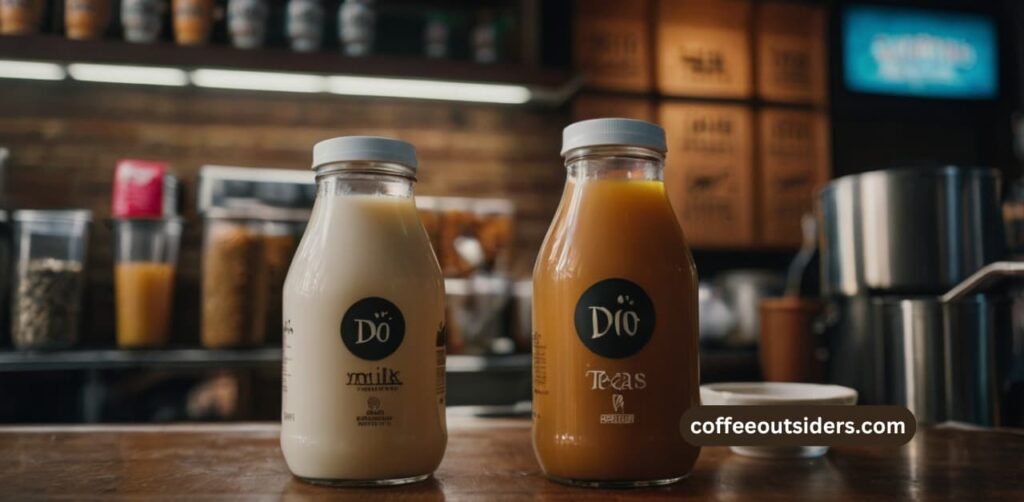
Essential Components
Taiwanese people invented milk tea, and then the world went absolutely nuts over it. The perfect blend of a few key elements makes its distinct flavor and texture. Here’s a list of what goes into a classic milk tea:
Black tea leaves are the most common, though green and oolong teas are also used. The quality of the tea affects the overall taste — premium leaves produce a stronger flavor. They give milk tea its punchy flavor; for example, black tea, which is harder to make without them. This tea typically has about 20-70 mg of caffeine per 8 oz serving. It’s a moderate source of caffeine, contributing around 8.9% of your daily allowance.
The milk used can be dairy, like evaporated or condensed milk, which contributes to a smooth and velvety texture. Non-dairy alternatives, like almond or soy milk, are also common and can impart their own delicate notes. Each type of milk changes how your drink tastes and how creamy it is. For example, condensed milk adds a robust flavor and some sweetness to the tea.
Often sugar, but sometimes honey or syrups are added. These sweeteners balance the tea’s bitterness. A standard 304g serving of milk tea contains about 92 calories. Most of those calories come from 11 grams of carbohydrates, which include 10 grams of sugar.
A blend of all these ingredients creates a harmonious drink that is both refreshing and satisfying. The types of tea and milk used can differ by region, showing local preferences. In Taiwan, black tea is a regular drink. In some regions, it’s green tea that takes the stage with its lighter and somewhat more floral flavor.
Flavor Additions
Milk tea can be customized with different flavor additions to suit personal tastes. Here are some popular options:
Vanilla, caramel, and hazelnut syrups are common, each offering a distinct sweetness that can enhance or mask the tea’s natural flavors. Adding fruits like mango, lychee, or passion fruit not only alters the taste but can also change the caffeine perception, making it feel less intense as the fruitiness takes the forefront.
Many bubble tea shops love to use winter melon syrup. It adds a refreshing, subtly sweet flavor that pairs well with both black and green teas. These additions can make a drastic difference to the drink’s profile.
A milk tea with vanilla syrup provides this creamy flavor explosion. A milk tea with mango chunks brings a delightful tropical twist. These variations have helped bubble tea shops gain popularity. Customers love to play with different flavors and textures.
Nutritional Information of Milk Teas
When delving into the realm of milk teas, the nutritional breakdown is crucial. Milk tea packs a one-two punch by pairing the antioxidants in tea with the calcium, potassium, and vitamins D and B12 that milk offers. These nutrients help to build strong bones and muscles.
A standard milk tea is often prepared with a 1:1 ratio of tea to milk, usually opting for whole milk to achieve that creamy texture we all love. This choice can make a big difference to the calorie count. For instance, adding 4 ounces (120 ml) of whole milk to an 8-ounce (240 ml) drink adds about 75 calories. That’s a very substantial increase in calories all from the milk!
Depending on the type of milk you choose, it contains up to 16.7g of saturated fat per serving.
Adding sugars and syrups to your milk tea can further increase the calorie count. Just a teaspoon of sugar adds about 16 calories, while a tablespoon of honey contributes a hefty 64 calories. These sweeteners can instantly transform your refreshing drink into a calorie-laden treat.
For example, if you add a tablespoon of honey and a teaspoon of sugar, you’re consuming a handful of extra calories—80 extra calories in total. That’s a small change that can really add up! This is not even counting the base calories from the milk.
Sugar tastes great, but it’s too easy to find in our food. We often consume too much, carrying excess calories, which probably won’t fit into everyone’s dietary goals.
Thinking about nutritional information when choosing your milk tea goes beyond just calories. It’s about choosing what works for your body. Some people cut calories by switching from whole to skim milk. This simple switch could bring that calorie contribution down to about 42 calories from the milk.
In addition, some people experience bloating, gas, or indigestion from dairy, making plant-based milks an option. Comprehending these nutritional aspects enables you to sidestep adverse effects and relish a drink that aligns with your lifestyle.
Importance of Knowing Caffeine Levels
That’s why learning about caffeine levels is key for health-conscious individuals. Caffeine affects how you feel throughout the day. If you are health-conscious, you might be wondering how much caffeine is in your cup of milk tea. This information can make a big difference in your decisions! It is vital to be awake and aware. At the same time, you don’t want to wear your body out.
The caffeine dosage in boba tea averages approximately 47.5 mg per 16 fl oz serving. This is around 11.9% of the recommended daily intake (RDI) of 400 mg. That’s not a lot when you consider it. However, it really adds up, especially if you aren’t having many other caffeinated drinks throughout the day. If you stop into the café down the street fairly often, those little purchases add up. This can help you better visualize your everyday consumption.
When you know what’s in your drink, you can make smarter choices. Let’s say you love the bright orange color of Thai milk tea. You also can’t get enough of its bold black tea flavor! That’s seductive, isn’t it? It’s also worth noting that it isn’t caffeine-free. It can also pack a punch of calories and sugar!
So, next time you’re choosing a drink, consider what you’re putting into your body. It could be worth going for something with less caffeine if you’ve already had your morning coffee. (sips drink) while still watching your caffeine. That way, you aren’t getting that disrupted sleep and those jittery feelings.
Young people, particularly millennials and Gen Z, have embraced boba tea as a trendy, Instagrammable drink. Even with all the hype, it’s wise to take the caffeine content in these drinks into account. When everyone around you is grabbing a cup, it’s really easy to get in on it.
Thanks to informed choices, you can reap the benefits of the trend without the unfortunate side effects. If you have work, classes, and a social life to keep track of, how you regulate your caffeine levels can make all the difference. A tiny but great way to keep on top of everything!
Caffeine-Free and Low-Caffeine Alternatives
Discovering milk tea without the kick of caffeine is worth the trip. For those who want to skip the caffeine, there are lots of options.
Caffeine-Free Options
When it comes to caffeine-free milk tea, herbal teas dominate the scene. These teas, made from a variety of plants, flowers, and fruits, offer diverse flavors and health benefits. Popular choices to consider are chamomile, which calms, South African red tea rooibos, which is sweet and nutty, and hibiscus, which is tart and refreshing.
These herbal teas make an excellent alternative base for milk teas, minus the caffeine jolt. The flavor profiles of these caffeine-free options vary from traditional milk teas. Black tea and green tea taste strong and can be a bit bitter. Herbal teas, on the other hand, please the palate with their sweetness and aroma.
Let’s say a honey-infused chamomile milk tea. Otherwise, savor a rooibos blend with vanilla for a soothing caffeine-free experience. For those wishing to avoid stimulants, these drinks provide a reassuring replacement.
The demand for caffeine-free blends has been increasing as consumers look for healthy, soothing beverages. Products like “Brown Sugar Milk” skip the tea altogether, focusing on rich, creamy flavors. The demand for caffeine-free milk teas is all the craze. As a result, these drinks are becoming widely available, with no fear of caffeine consumption.
Low-Caffeine Choices
For caffeine lovers, low-caffeine milk tea options are great. Here’s a quick list of teas that can be prepared with lower caffeine content:
- White tea is known for its delicate flavor and lower caffeine levels.
- Oolong tea offers a balance between green and black tea with moderate caffeine.
- Decaffeinated black tea retains the classic taste with minimal caffeine.
Brewing methods also significantly influence the caffeine content of both these teas. Steep black tea bags in hot water for just a few minutes, and you’ll have a weaker drink because of it. A longer steep time of around 10 minutes increases caffeine marginally, but it is still manageable for those who are caffeine sensitive.
These low-caffeine options are ideal for shoppers who want a gentler sip. They provide a nice little pick-me-up without the jitters and crash of high-caffeine beverages. Milk teas have a caffeine content that ranges from 35 to 250 mg per cup. Most of the low-caffeine options you enjoy keep that range closer to 20 to 70 mg.
Recommended Daily Intake of Milk Tea
When it comes to milk tea, you just have to get the mix right. This means that the general guideline for caffeine consumption is that up to 400 milligrams per day is safe for most adults. Since milk tea does have caffeine, keeping track of how much you consume is important.
A cup of milk tea generally has 20 to 60 milligrams of caffeine. This amount varies depending on the type of tea and the brewing method. You can enjoy several cups a day and not go overboard. Just keep an eye on other sources of caffeine, like coffee, chocolate, and energy drinks. Knowing these numbers lets you enjoy milk tea without it interfering with your sleep or daily routine.
The key to getting the best out of milk tea, without any negative side effects, is moderation. Milk tea typically will not disturb your sleep if consumed in moderation. However, if you drink too much, you could experience bloating or indigestion, particularly since the creamy milk can be hard to digest for some.
Milk tea isn’t just any old treat, though. It’s loaded with antioxidants from the tea and full of calcium, potassium, and vitamins D and B12 from the milk. These nutrients are excellent at helping keep your bones and muscles strong.
Listen to your body. Pay attention to how it responds to dairy, because everyone reacts differently. It’s important to be mindful of your overall caffeine intake. The caffeine in milk tea is just one puzzle piece.
Did you know that 30% of the world’s tea is enjoyed as milk tea? This statistic is a reflection of the massive global popularity of the drink! You can easily slip it into your daily routine. Think of all the other foods and drinks that are high in caffeine.
This holistic approach keeps you grounded. It also gives you the opportunity to reap the rewards that milk tea offers. Whether you’re a college kid cramming for exams or a young professional trying to balance a crazy work life, balance your caffeine wisely.
By making intentional choices about what you consume, you may enhance focus and energy levels without the jittery side effects or crashes.
Conclusion
Milk teas can hold a lot of caffeine. They often mix black or green tea, so they are loaded with caffeine. Knowing this helps you make a wise choice. I love tasting different stuff. I always check the caffeine. It matters if you do a lot of sipping. Some days, the energy boost feels great. Other days, a caffeine-free option fits better. It’s all about balance. Whether you brew at home or grab one on the go, choices abound. Want to have milk tea but without the caffeine buzz? Consider herbal blends or decaf options. Enter your milk tea odyssey, eyes open. Read, relax, and get updated. Keep learning about what you drink. Want to know more? Follow our guides and find your perfect brew. Your flavor journey awaits!
Frequently Asked Questions
Not all milk teas contain caffeine. Traditional milk teas made with black or green tea do have caffeine. However, herbal or rooibos-based milk teas are typically caffeine-free.
A typical milk tea will have 30–60 mg of caffeine per 8 oz serving, depending on the tea base. Black tea contains more caffeine than green or white.
Yes, choose caffeine-free options such as herbal or rooibos milk teas. Those options provide the milk tea experience without the caffeine.
Milk tea is usually made with brewed tea, milk or a milk substitute, and sweeteners. The type of tea you use will determine the amount of caffeine.
Milk tea can provide antioxidants from the tea and calcium from the milk. It can also have added sugars, so moderation is important.
Knowing the caffeine content, you can make it work for you. This is especially important if you’re sensitive to caffeine or trying to cut back for health purposes.
Choose milk teas made with green or white tea for less caffeine. Herbal and rooibos teas are naturally caffeine-free.

